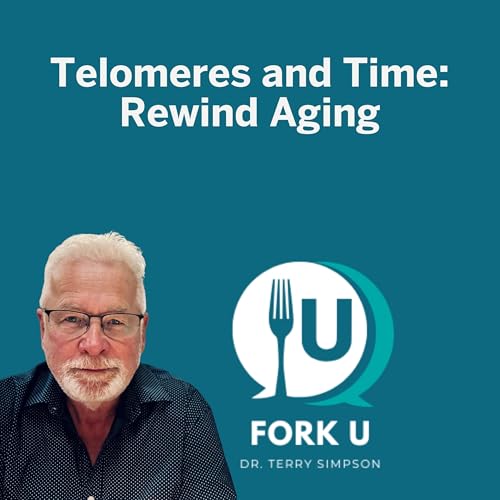
Telomeres and Time: Rewind Aging
No se pudo agregar al carrito
Add to Cart failed.
Error al Agregar a Lista de Deseos.
Error al eliminar de la lista de deseos.
Error al añadir a tu biblioteca
Error al seguir el podcast
Error al dejar de seguir el podcast
-
Narrado por:
-
De:
The Lowest Hemoglobin I’ve Ever Seen
The lowest hemoglobin I’ve ever seen belonged to a young woman who was still standing. Her blood count was one-fourth of normal. She was pale, short of breath, and strong enough to walk into the clinic.
Doctors soon learned her bone marrow had stopped making new blood cells. The diagnosis was aplastic anemia — a true telomere disease.
She survived thanks to her fitness, modern science, and a bone marrow transplant from a generous donor in Germany. Two years later, she’s in law school, healthy, and full of life.
What Are Telomeres?
Each cell in your body carries chromosomes — long strands of DNA. At the ends of those chromosomes sit telomeres, tiny caps that keep the DNA from unraveling, like plastic tips on shoelaces.
Every time a cell divides, its telomeres shorten a little. When they get too short, the cell can no longer divide. Scientists call that stage cellular senescence — cellular retirement.
In 2009, researchers Elizabeth Blackburn and Carol Greider won the Nobel Prize for discovering telomerase, an enzyme that can rebuild telomeres. Their discovery sparked dreams of reversing aging. But there’s a catch: cancer cells also use telomerase to live forever. Turning that enzyme on everywhere might turn back time — or turn on tumors.
Why Everyone Talks About TelomeresTelomeres became the poster child for longevity marketing.
Social media ads promise to “measure your biological age.” Supplement companies claim to “lengthen your telomeres” for hundreds of dollars a bottle.
The problem? Telomere tests vary between labs. Results can change by 20 percent depending on the method. They show trends, not destiny.
What’s Being Studied
Real scientists are studying how telomeres behave under different conditions.
- Danazol — a synthetic sex hormone that slows telomere loss in people with inherited marrow failure. It works but brings side effects, so it’s not an anti-aging trick.
- Henagliflozin — a diabetes drug that increased telomere length in one small study. Whether that helps humans live longer is still unknown.
- Aripiprazole — an antipsychotic that repaired telomeres in cells after oxidative stress. That’s a Petri dish result, not a prescription for youth.
These drugs show that we can nudge biology, but they’re for disease, not for vanity.
Nutrients influence telomere health, too.
- Vitamin D supports telomerase. Long-term studies show it slows telomere shortening.
- Vitamins C and E help reduce chemical stress that wears telomeres down.
- Gamma-tocotrienol, a form of vitamin E, may reverse telomere loss — so far only in lab work.
- TA-65, from the Astragalus plant, may activate telomerase but carries risk. Turning on telomerase could also fuel cancer.
- Telomir 1 is experimental and not available outside research.
None of these is proven to extend life. They’re promising ingredients, not miracles in a capsule.
Lifestyle matters more than any supplement.
A large study at UCSF showed that people who ate a Mediterranean diet, exercised, and managed stress boosted telomerase activity within months.
No powder required.
Telomeres respond to care. They’re markers of how you live, not the cause of how long you live.
Longer telomeres don’t guarantee longer life — they reflect how your body has handled time, inflammation, and stress.
What...


